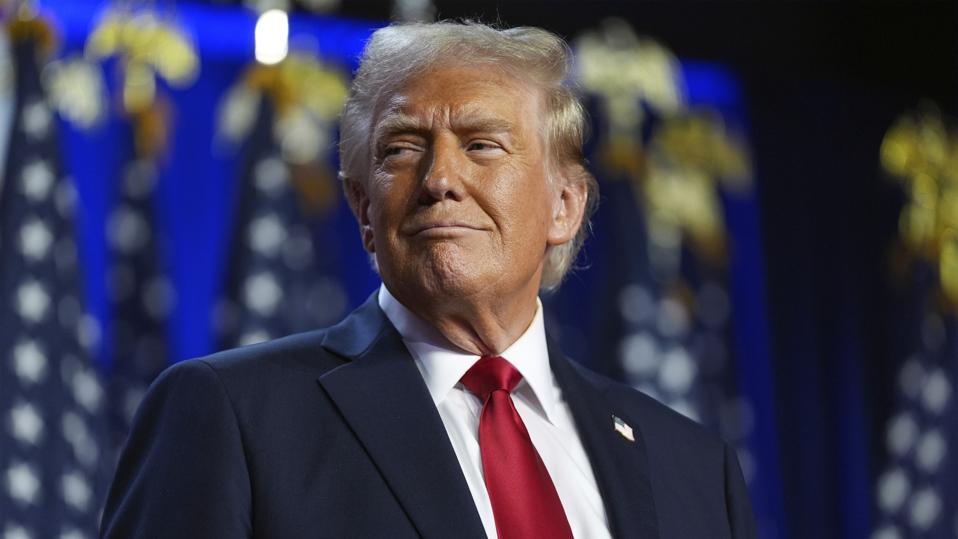Former President Donald Trump has said recently he opposes a federal ban on TikTok—which could go into effect as soon as January—but it’s not clear if he would be able to prevent the ban that has already been approved by President Joe Biden, which is tied up in legal challenges, from going into effect.

Trump joined TikTok earlier this year and vowed he would never ban the app, which is challenging a ban implemented by the Biden administration.
Copyright 2024 The Associated Press. All rights reserved
Key Takeaways
- Biden in April signed the TikTok ban, which requires ByteDance—TikTok’s China-based parent company—to sell the platform by January or be banned from U.S. app stores.
- TikTok and ByteDance almost immediately challenged the law in the courts, filing a suit that said the law was targeted, unconstitutional and violated the First Amendment and that it is “not possible technologically, commercially, or legally” to divest in the time given.
- Trump, who became the president-elect in Tuesday’s election, previously signed an executive order in 2020 that would have functionally outlawed the app, but was blocked in court.
- Trump changed his tune in March after reportedly meeting with GOP megadonor Jeff Yass, who had a major financial stake in the app—he later joined the platform and vowed to “never ban TikTok.”
- Trump also claimed the ban would only help Mark Zuckerberg and Facebook, which he considers “an enemy of the people,” and he later campaigned on his support of TikTok, saying in September, “For all of those who want to save TikTok in America, vote for Trump.”
Could Trump Stop The Tiktok Ban?
The deadline for TikTok to sell or be banned in the U.S. is Jan. 19, one day before Inauguration Day, which could make it hard for Trump to interfere. Trump could refuse to enforce the ban and not punish app stores that continue hosting the app, but at least one legal expert told Politico in September it would be “insane” for a company’s general counsel to allow it to violate the law, noting “Trump is incredibly fickle.” If the ban goes into effect before his presidency begins, Trump could also try to repeal it with the help of Congress.
Will Tiktok Be Banned In 2025?
It’s not clear. The U.S. Court of Appeals for the D.C. Circuit heard arguments challenging the federal law in September, and both sides asked the court to give its ruling on the ban’s legality by Dec. 6. However the court rules, the losing side will likely appeal to the Supreme Court, which would then issue a final ruling on whether the law could go into effect in January. As the law stands, TikTok would be banned from app stores in the U.S. on Jan. 19 unless the company divests from ByteDance. However, there was a stipulation in the law that gives Biden the power to extend the deadline by 90 days if he sees “significant progress” toward a sale. If that happens, the deadline would be extended into a Trump presidency.
Big Number
14 million. That’s how many followers Trump has on his TikTok page, which was launched in June.
Key Background
Talk of TikTok bans began years ago as lawmakers scrutinized the app and expressed concerns of national security issues related to what ByteDance was doing with the data it was collecting on users. In 2019, the U.S. reportedly launched a national security review of TikTok after lawmakers “raised concerns about TikTok’s growing influence in the United States,” The New York Times reported.
TikTok has insisted it does not and would not share data with the Chinese government, and has fought bans that have been brought at the state and federal levels. Despite the insistence it doesn’t share user data, Congress banned TikTok on federal devices in 2022, and more than half of all states also banned the app from being on state-issued devices. After Biden signed the ban in April as part of a $95 billion foreign aid package for Ukraine, Israel and Taiwan, Senate Majority Leader Chuck Schumer, D-N.Y., praised the move, saying it was “one of the most consequential measures Congress has passed in years to protect America’s security and the future of Democracy.”
When the bill was in the House, House Speaker Mike Johnson, R-La., said the bill was “an important bipartisan measure to take on China, our largest geopolitical foe, which is actively undermining our economy and security.” In its September hearing, the U.S. argued ByteDance’s ownership “creates a national-security threat of immense depth and scale,” although much of the government’s specific intelligence about why was redacted.

